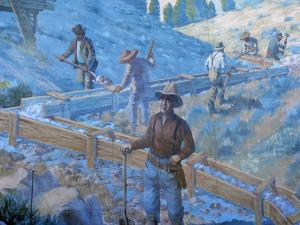
Trials and tribulations are a part of life. We might wish they were not, especially when they come with suffering, but it is impossible to grow, to change, that is, to develop ourselves, without them. We might question God as to why this is the case, we might try to figure out why this is so for ourselves, but, as the book of Job warns us, when we do this, we often are led astray by our own reasoning, leading us to unjust conclusions. Most of the time, we must deal with the situation we find ourselves in instead of theorizing how we got there; if we were poisoned, we would first deal with the poison before seeking out who poisoned us and finding out why they did so. Life is riddled with pain and sorrow; while it is possible to map out various explanations, various causes which come together to produce the challenges which confront us, we must always deal with those challenges face on. Certainly, from the Christian standpoint, sin has a major influence on the world (and our suffering), but it would be superficial to say all our suffering is the result of sin and leave it at that.
It is impossible for us to live out our life without undergoing all kinds of struggles. Moreover, we must recognize that many of our struggles would exist, even if we did not have to face and overcome some sort of evil in our life. Often, struggles are just the result of our own attempt to make something new, to do something new, that is, the result of some challenge which we make for ourselves so that we can develop ourselves, hopefully making ourselves better. And sometimes, we find ourselves being entertained by our struggles, as can be seen by the way so many of us enjoy playing sports, or by listening to and learning from the struggles of others, showing that we do not find everything connected to our struggles as something which we want to avoid.
It is imperative that we do not let our struggles, no matter how difficult or painful they become, get the best of us. Even if they are impossible for us to overcome, even if they might end up killing us, we can still overcome them by not letting them destroy our own personal integrity. This is not to say we should constantly take on our struggles all by ourselves, that, at every moment in life, we should be engaging in some kind of struggle. When we grow weary, when we find it difficult to carry on, we might need some rest or help from someone else to make sure we can carry on. As Christians, we should recognize one of the greatest source of aid we can get is God’s grace, which is why, as St. Ammonas said, we should go to God in prayer, hoping that God will give us what we need to endure whatever trials come our way: “And the medicine for passing through the trials is that you should not grow weary, but pray to God from your whole heart, giving thanks and showing patience in all things, then the trial will pass from you.”[1]
Patience is always important, but being patient does not mean we should just sit back and do nothing when we see the need for change (either in ourselves or in the world around us). We must do what we can without expecting things to change instantly. It often takes time to make for lasting change. But, when we act, even when we know we must act in haste, we must do so in the spirit of patience. That will help us accept our own limitations, never expecting too much from ourselves.
Thus, we must accept, as we engage life and the challenges it brings us, we are going to grow weary. The longer our struggles go on, the more difficult and painful they are, the more they will leave us weary. Such weariness is going to affect us emotionally. We should not let our sorrow grow into despair. One way to do that is to keep in mind that our struggles are times of opportunity and change for us, opportunities not only for us to make something better out of ourselves, to grow, and in that development, in the good which we see coming out of what we have done, find we have something which can and will bring us joy.
Suffering in and of itself is not a good. We should not create some sort of spirituality which romanticizes suffering, making people seek after it as if it were a good in and of itself; such masochism is far from what God would have us embrace. Nonetheless, it is also true, because of the good which comes out of such trials, even the worst ones, it is possible to find some joy in them. The joy comes from the good, not the evil which lies behind such suffering. This is why many, like Ammonas, will point to that joy as a way to help people endure their trials:
I know that you are in travail of heart, and have entered into great trial. But if you bear it nobly, joy will come to you. For if trial does not come upon you, either openly or secretly, you cannot progress beyond your present measure. For all the saints, when they asked that their faith might be increased, entered into trial. For when a man receives a blessing from God, at once his trial is increased by the enemy, who wants to deprive him of the blessing with which God has blessed him. [2]
Again, it is important not to turn this realization into justification for masochism, so that people purposefully cause themselves to endure all kinds of suffering, thinking it is the only way to experience blessing and joy in their lives. Suffering is never a good, as it is an indication of some sort of evil affecting us. In the kingdom of God, in heaven, where all that is good will be collected and preserved, there will be no more suffering, no more sorrow, which means, such suffering must never be equated with a good.
Suffering, sadly, is a given in temporal existence. It likely has many sources, which is why no one answer, no one humanly constructed theodicy, can be given to explain it. What we do when we encounter it will help determine who and what we are, not just in time, but in eternity. Let us try to do the best we can, never giving in, though looking to God (and others) to help us so we can deal with our trials and tribulations the best way possible.
[1] Ammonas, “Letter IX” in The Letters of Ammonas. Trans. Derwas J. Chitty. Revised Sebastian Brock (Fairacres, Oxford: SLG Press, 1995), 12.
[2] Ammonas, “Letter IX” in The Letters of Ammonas. Trans. Derwas J. Chitty. Revised Sebastian Brock (Fairacres, Oxford: SLG Press, 1995), 11.
Stay in touch! Like A Little Bit of Nothing on Facebook.
If you liked what you read, please consider sharing it with your friends and family!
N.B.: While I read comments to moderate them, I rarely respond to them. If I don’t respond to your comment directly, don’t assume I am unthankful for it. I appreciate it. But I want readers to feel free to ask questions, and hopefully, dialogue with each other. I have shared what I wanted to say, though some responses will get a brief reply by me, or, if I find it interesting and something I can engage fully, as the foundation for another post. I have had many posts inspired or improved upon thanks to my readers.













